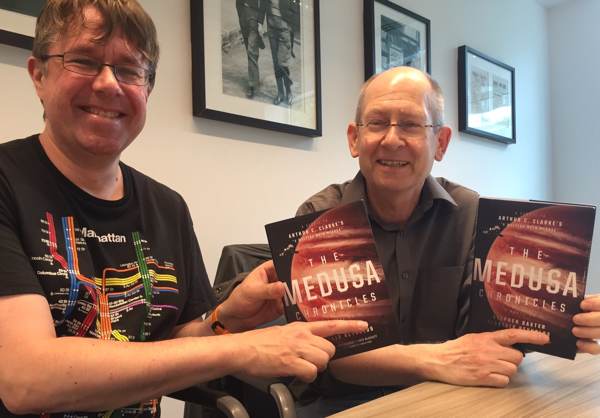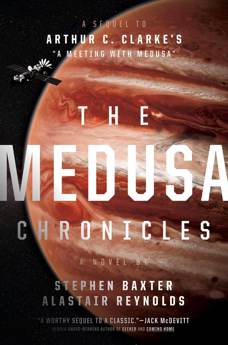Arthur C. Clarke and his vision of world government

As I write, the aftermath of Brexit is being felt around the world -- Britain's historic exit marking an end to the forty-year membership of the European Union. It's ironic that this should coincide with the launch of The Medusa Chronicles, because the EU, a voluntary nation-states, is a kind of regional prototype of a world government of the kind which we feature in Chronicles, and which featured prominently in Arthur C Clarke's own thinking, and his writing.
 Stephen Baxter and Alastair Reynolds The Medusa Chronicles is available from Amazon.
Stephen Baxter and Alastair Reynolds The Medusa Chronicles is available from Amazon.A world government is there in the background of A Meeting with Medusa, the 1971 novella which we took as our starting point. By the 2080s, we're told, humanity enjoys a "secure and prosperous global society." When Howard Falcon plans his mission to Jupiter it is under the sponsorship of a directorate of "Long Range Planning" and a "Bureau of Astronautics." We extended this model in our sequel - even though our utopian world government ultimately crumbles under the pressure of an existential war. Clarke, however, had been writing of world governments at least as far back as books like The Deep Range (1957).
A future world government was a common assumption in post-Second World War SF, presumably inspired by the multinational institutions that emerged after that war - the UN, the EU. Their purpose was to prevent a war between countries armed with atomic weapons, and to manage such challenges as poverty on a wider scale than the nation-state. You could even find it in children's fiction. In Gerry Anderson's space-opera TV puppet show Fireball XL5 (1962-3), the heroic Colonel Steve Zodiac serves in a World Space Patrol. "We now had the United Nations and I imagined, rightly or wrongly, that there would be a World Government in the future," Anderson said.
But the idea of a world government has a longer history. In the nineteenth century Prince Albert, Consort of Queen Victoria, was one perhaps surprising advocate: "We are living at a period of the most wonderful transition, one which tends rapidly to accomplish that great end to which all history points - I mean, of course, the realization of the unity of mankind." His way of achieving that aim was to tie together the empires of Europe with bonds of royal marriage, as if one sprawling dynasty ruled all. To that end he arranged the marriage of his eldest daughter "Vicky" to "Fritz," heir to the throne of Prussia, the most militant of the German states. But in the 1870s Chancellor Bismarck dismissed Albert's dynastic fancies; he unified Germany under Prussia by leading it into war with France. Later the First World War slaughtered millions, even though the monarchs of Britain, Germany, Russia and the rest were all related.
HG Wells's Modern Utopia (1905) depicted a world state with unified travel and economic management - but it was not truly democratic, being governed by "Samurai," a self-selecting elite class. Churchill was an early opponent of this idea, arguing that government should never be left in the hands of "experts." And this kind of dream of scientific control would, unfortunately, have ghastly echoes in Nazi Germany.
In the modern world nations are driven to cooperate because we face threats which cross national boundaries, such as the impact of nuclear weapons or climate change. Looking further ahead, space advocates argue strongly for unified governance on Earth before we move into space; a war waged with the huge energies available to interplanetary travellers could wipe out our civilization altogether. But some academics think that even without such external pressures we are naturally evolving towards a world government, as the nation states weaken and barriers between them become porous electronically. The big problem, as HG Wells depicted and as has been played out in the EU, will be democratic accountability.
And this is roughly the position taken by Arthur C Clarke.
It was in 2061: Odyssey Three, the third book of the Space Odyssey sequence (1987) that Clarke described most specifically this might come about. From the coming of the jet age and of global communications, "the human species . . . was merging together, as the old linguistic and cultural divisions began to blur." The presence of multitudes of each nations' citizens in foreign countries is another binding factor, and a disincentive to war.
A minor nuclear conflict requires the big powers of China, the US, and the USSR (the book was written before the fall of the Berlin Wall) to cooperate to contain it. A major nuclear war becomes unthinkable for its sheer devastation, and in an "Age of Transparency" from the 1990s, with global surveillance by governments and private organizations, it is no longer even possible to plan a major war.
By 2060, "there was surprisingly little opposition when that popular monarch, Edward VIII, was elected the first Planetary President." An immediate benefit is an economic boost from the 'dismantling of the vast and wholly parasitic armaments industry' -- just as the founding of the European Community put a stop to the cost, as well as the destructiveness, of war in Europe. And a united mankind turns to the exploration of space as a new grand venture.
It's an entrancing idea that world government could simply come about as we become more sane - and after all the Berlin Wall did fall more or less painlessly, putting an end to the nightmare of the Cold War. HG Wells foresaw this too, in his own flawed utopian vision: "It is not by assimilation . . . but by understanding that the modern utopia achieves itself."
It may be that under the pressure of technological change and global issues, when it comes to a world government, ultimately we may not have much choice, and some day we may wake up and realise it. Maybe Arthur C Clarke had it right after all.
Stephen Baxter was born in Liverpool, England, in 1957. He holds degrees in mathematics from Cambridge University, engineering from Southampton University, and business administration from Henley Management College. Since 1987, he has become one of the most preeminent science fiction writers of his generation, having published over 40 books and 100 short stories. A world-renowned bestselling author, Baxter has won literary awards in the United Kingdom, United States, Germany and Japan, including the British Science Fiction Award. He now lives in Northumberland with his wife. His latest novel, The Medusa Chronicles, co-written with Alastair Reynolds, and called "a resounding sweep of a story with rich seams of science and speculation" by Tor.com, is available now from Saga press. Follow Steve on his site.